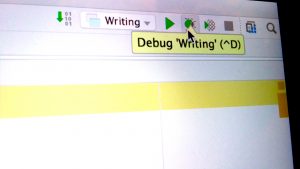
Many difficulties were encountered during the process of completing the formal report. However, overcoming these difficulties made the entire process very rewarding. In Unit Three, we also learned the art of writing with “You” attitude. The You Attitude changed and “debugged” the way I thought about technical communication, and writing with our readers in mind. Here are some of my thoughts regarding Unit Three:
Researching for the Formal Report
A large part of my formal report investigates specific techniques to implement an appointment system to my workplace, the Fido Retail store in Coquitlam Centre. Because I know that Fido often encounters customers who need emergency support (for example, customers who lost their cell phone), I wanted to investigate ways that successful retail businesses and clinics handle such emergencies. So I began searching for articles that may offer insights in the most effective way to schedule appointments. The difficulty surfaced as I realized that many existing research articles use heavy mathematics and algorithms to explain how appointments can be effectively scheduled into the system. For most of these articles, I was unable to understand how the math and algorithm operates to incorporate it into my formal report. Fortunately, I was able to overcome this difficulty by finding a specific research study that explained the most efficient way to handle emergency appointments in its analysis. Not only did this particular study provide content for my formal report, the study reminded me of the importance of clarifying results findings for the general readers. Once again, I realized that writing for the intended audience is a very important aspect of technical communications.
Another issue I encountered during the research stage is trying to get people to participate in my survey. The target participants of my survey are my colleagues from the Fido store. Despite the fact that the survey is conveniently available online, many people delayed taking the survey, and some did not end up taking the survey at all. Although there were 10 employees in my workplace, only 7 people participated in the survey. As a result, I have discussed small sample size as one of the limitations of the study.
Organizing the Formal Report
Because of the formal report outline assignment, organizing the sections of the formal report was extremely easy. I did, however, make changes to the sections due to research limitations. For example, due to time constraint and the issue of obtaining permission, I was unable to do an observation study of a second successful appointment system. Instead, I decided to replace this section with an analysis existing research on appointment scheduling. Looking back, I am glad for this change of plan because the research on appointment scheduling is more valuable for the formal report than observing another example of an appointment system.
Writing the Formal Report
With the outline and research completed, writing the report was much easier than I expected. The sample analytic report in the Technical Communications textbook is extremely helpful in guiding my formal report writing.
While completing my formal report draft, I learned to use the table of contents tool provided my Microsoft Words. Initially, I attempted to create a table of contents from scratch, before realizing that the page numbers don’t line up properly on the right side of the page. Not only does the Microsoft Word tool allow for a cleaner, professional-looking table of contents, the tool also directs readers to the desired section when they click on section name in the table of contents.
Peer Review
With each peer review written, I find greater improvements in writing with ‘you’ attitude. The recent instructor blog post by Dr. Paterson is extremely helpful in showing me how to apply the ‘you’ attitude to peer reviews. I realized that the peer reviews I’ve written prior to learning about ‘you’ attitude may have been slightly offensive to the peer whose work I reviewed. In my usual correspondences, I tend to be very direct with what I want to say. Writing with ‘you’ attitude is difficult in that it requires the writer to be indirect with what they intend to write, especially if they want to correct the target reader. I hope to gain more practice in writing with ‘you’ attitude before the end of the course.
Enclosure: Unit Three Reflections Word Doc
